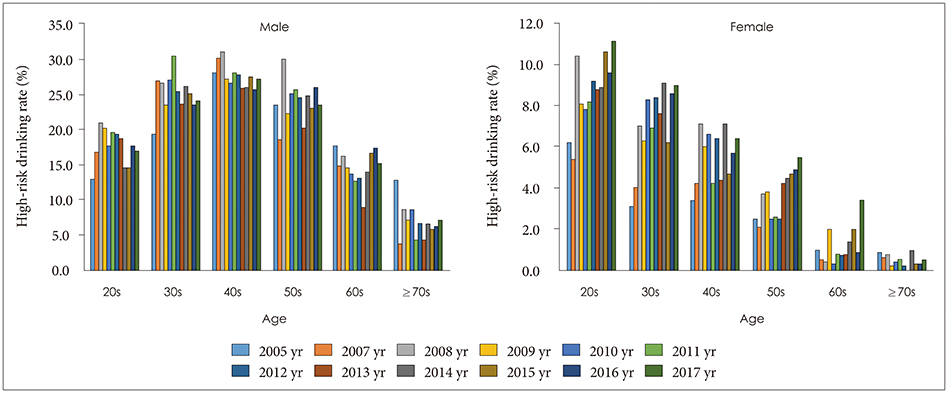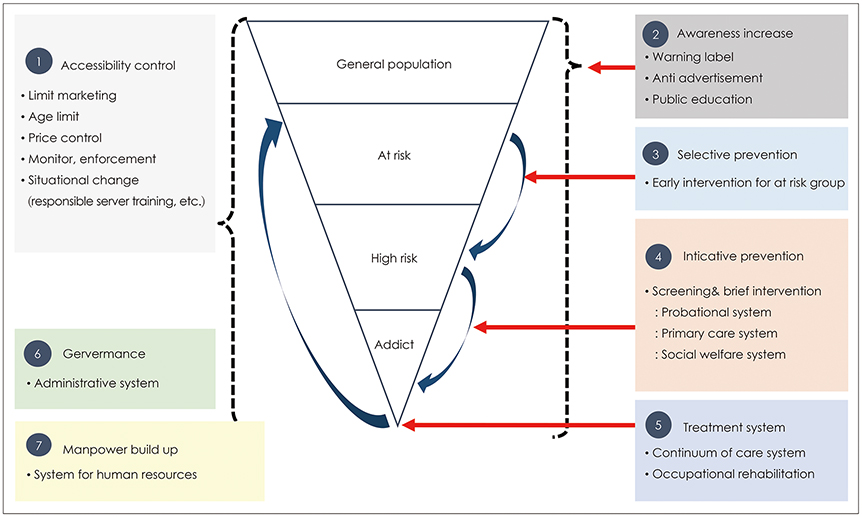J Korean Neuropsychiatr Assoc.
2019 Aug;58(3):152-158. 10.4306/jknpa.2019.58.3.152.
Epidemiology of Alcohol Use Disorders and Alcohol Policy
- Affiliations
-
- 1Department of Psychiatry, Uijeongbu St. Mary's Hospital, College of Medicine, The Catholic University of Korea, Uijeongbu, Korea. nplhk@catholic.ac.kr
- KMID: 2456594
- DOI: http://doi.org/10.4306/jknpa.2019.58.3.152
Abstract
- Alcohol is a substance that has a negative impact on public health according to the various drinking patterns and amount consumed. Alcohol epidemiology covers an investigation of the prevalence of alcohol use disorders, high risk drinking behaviors, and level of consumption per capita. The epidemiologic data of alcohol is an important guide to develop evidence-based alcohol policies. The high rate of drinking among middle aged males and young females is the result of recent socio-economic changes in South Korea and aggressive marketing from the alcohol industry. The high rate of treatment among middle-aged men indicates that the treatment of alcoholism begins later. Regarding alcohol policy, restrictions on alcohol accessibility and advertisement, and brief intervention systems might help reduce alcohol problems. In addition, a continuum of care system needs to be established to provide timely appropriate treatment and rehabilitation services.
Keyword
MeSH Terms
Figure
Reference
-
1. Babor T, Caetano R, Casswell S, Edwards G, Giesbrecht N, Graham K, et al. Alcohol: no ordinary commodity: research and public policy. NY: Oxford University Press;2003.2. Jo JB, Lee CT, Kweon YS, Lee KU, Lee HK, Jo SJ, et al. Twelvemonth prevalence and correlates of hazardous drinking: results from a community sample in Seoul, Korea. J Korean Acad Addict Psychiatry. 2011; 15:65–74.3. Lee HK, Chou SP, Cho MJ, Park JI, Dawson DA, Grant BF. The prevalence and correlates of alcohol use disorders in the United States and Korea--a cross-national comparative study. Alcohol. 2010; 44:297–306.
Article4. Rehm J, Room R, Monteiro M, Gmel G, Graham K, Rehn N, et al. Alcohol as a risk factor for global burden of disease. Eur Addict Res. 2003; 9:157–164.
Article5. Beigel A, Hunter EJ, Tamerin JS, Chapin EH, Lowery MJ. Planning for the development of comprehensive community alcoholism services: I. The prevalence survey. Am J Psychiatry. 1974; 131:1112–1116.6. Lee HK, Lee CT, Kweon YS. Developing effective guideline for moderate drinking. J Korean Acad Addict Psychiatry. 2006; 10:73–85.7. Savolainen VT, Liesto K, Männikkö A, Penttilä A, Karhunen PJ. Alcohol consumption and alcoholic liver disease: evidence of a threshold level of effects of ethanol. Alcohol Clin Exp Res. 1993; 17:1112–1117.
Article8. Batey RG, Burns T, Benson RJ, Byth K. Alcohol consumption and the risk of cirrhosis. Med J Aust. 1992; 156:413–416.
Article9. Bagnardi V, Blangiardo M, La Vecchia C, Corrao G. A meta-analysis of alcohol drinking and cancer risk. Br J Cancer. 2001; 85:1700–1705.
Article10. Institute of Medicine, Committee on Prevention of Mental Disorders. Reducing risk factors for mental disorders: frontiers for preventive intervention research. Washington, DC: National Academy Press;1994.11. Kim YS. A Epidemiological study on the prevalence of alcohol use disorders among the Korean adult population. Korean J Soc Welf. 1999; 37:67–88.12. The Ministry of Health and Welfare. The survey of mental disorders in Korea. Sejong: The Ministry of Health and Welfare;2017.13. Chou SP, Lee HK, Cho MJ, Park JI, Dawson DA, Grant BF. Alcohol use disorders, nicotine dependence, and co-occurring mood and anxiety disorders in the United States and South Korea-a cross-national comparison. Alcohol Clin Exp Res. 2012; 36:654–662.
Article14. The Ministry of Health and Welfare, Chung-Ang University industry Academic Cooperation Foundation. Identifying the causes of socioeconomic poverty and inequality in drinking and developing practical and policy strategies for the improvement and recovery of drinking problems of the vulnerable. Sejong: The Ministry of Health and Welfare;2015.15. World Health Organization. Global status report on alcohol and health 2014. Luxembourg: World Health Organization;2014.16. Korea Centers for Disease Control and Prevention. 2017 Korean National Health and Nutrition Examination Survey. Cheongju: Korea Centers for Disease Control and Prevention;2018.17. World Health Organization. Global status report on alcohol and health 2011. Switzerland: World Health Organization;2011.18. Health Insurance Review & Assessment Service. Medical status internal data for 2016 of health insurance alcohol use disorder by age and gender. Seoul: Health Insurance Review & Assessment Service;2016.19. National Center for Mental Health. National mental health statistics_pilot study. Seoul: National Center for Mental Health;2016.20. Lee BH, Lee HK, Jeo KH, Chung S, Oh HS, Chon Y, et al. A study on the esimation of community-based services demands ofr the management of patients with alcohol use disorder. J Korean Acad Addict Psychiatry. 2019; 23:33–39.
Article21. Roh S, Lee HK, Ki SW. The concept and effectiveness of alcohol policy. J Korean Acad Addict Psychiatry. 2009; 13:104–113.22. The Ministry of Health and Welfare, The Catholic University of Korea Industry-Academic Cooperation Foundation. Development of national addiction prevention management policy and service delivery system. Seoul: The Catholic University of Korea Industry-Academic Cooperation Foundation;2012.23. Gruenewald PJ, Millar AB, Roeper P. Access to alcohol: geography and prevention for local communities. Alcohol Health Res World. 1996; 20:244–251.24. Chaloupka FJ, Grossman M, Saffer H. The effects of price on alcohol consumption and alcohol-related problems. Alcohol Res Health. 2002; 26:22–34.25. Howard-Pitney B, Johnson MD, Altman DG, Hopkins R, Hammond N. Responsible alcohol service: a study of server, manager, and environmental impact. Am J Public Health. 1991; 81:197–199.
Article26. Lang E, Stockwell T, Rydon P, Beel A. Can training bar staff in responsible serving practices reduce alcohol-related harm? Drug Alcohol Rev. 1998; 17:39–50.
Article27. HM Government. The government's alcohol strategy. London: The Stationery Office;2012.28. The Ministry of Health and Welfare. Action plan for alcohol-related harms prevention. Sejong: The Ministry of Health and Welfare;2018.29. Daily NTN. [2019 Tax law revision] Reorganization of the liquor tax system with specific duty. Seoul: Daily NTN, Inc;updated 2019 Jul 25. cited 2019 Jul 31. Available from: http://www.intn.co.kr/news/articleView.html?idxno=2006994#0BXR.30. Botvin GJ, Baker E, Dusenbury L, Botvin EM, Diaz T. Long-term follow-up results of a randomized drug abuse prevention trial in a white middle-class population. JAMA. 1995; 273:1106–1112.
Article31. Hansen WB. Prevention of alcohol use and abuse. Prev Med. 1994; 23:683–687.
Article32. Saffer H, Dave D. Alcohol consumption and alcohol advertising bans. Appl Econ. 2002; 34:1325–1334.
Article33. Kaner EF, Dickinson HO, Beyer F, Pienaar E, Schlesinger C, Campbell F, et al. The effectiveness of brief alcohol interventions in primary care settings: a systematic review. Drug Alcohol Rev. 2009; 28:301–323.
Article34. Lee HK, Lee MS, Kee SW, Choi SW, Joe KH, Park A, et al. Developing trerapeutic framework for treatment of alcoholism- focused on Seoul alcohol action plan. J Korean Assoc Soc Psychiatry. 2007; 12:57–67.35. Levine HG. The birth of American alcohol control: prohibition, the power elite, and the problem of lawlessness. Contemp Drug Probl. 1985; 12:63–115.36. Room R, Jernigan D, Carlini-Marlatt B, Gureje O, Mäkelä K, Marshall M, et al. Alcohol in developing societies: a public health approach. Helsinki: Finnish Foundation for Alcohol Studies;2002.
- Full Text Links
- Actions
-
Cited
- CITED
-
- Close
- Share
- Similar articles
-
- The Epidemiology of Alcohol Use Disorders
- Epidemiology of alcoholic liver disease in Korea
- Recent Advances in Alcohol Use Disorders: Characteristics and Treatment of Alcohol Use Disorder in Women
- Sleep and Alcohol
- Burden of alcohol use disorder, alcohol-related liver disease, and alcohol-related liver cancer: Editorial on “Global epidemiology of alcohol-related liver disease, liver cancer, and alcohol use disorder, 2000–2021



